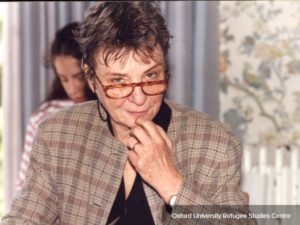Vale Barbara Harrell-Bond
 The humanitarian world this week farewelled an inveterate champion of refugees in Dr Barbara Harrell-Bond; the first humanitarian academic and activist to argue that refugees were not helpless victims but individuals with strengths and resilience.
The humanitarian world this week farewelled an inveterate champion of refugees in Dr Barbara Harrell-Bond; the first humanitarian academic and activist to argue that refugees were not helpless victims but individuals with strengths and resilience.
Dr Harrell-Bond worked tirelessly for more than 35 years to improve protections for refugees, to ensure that their voices were heard not only in academic research but in real-world policy debates.
She died recently at her home in North Oxford, UK.
Her research and teaching were inspirational to generations of scholars and aid workers and colleagues say she always spoke truth to power, taking on donor governments, UN bodies, large non-governmental organisations, and countries hosting refugees alike.
Her work and activism, backed by robust evidence, served as an example to generations of people working in the refugee sector.
She trained as a legal anthropologist at Oxford University under the supervision of eminent anthropologist Edward Evan Evans-Pritchard in the 1960s.
Dr Harrell-Bond went on to establish the Refugee Studies Program at Oxford, now known as the Refugee Studies Centre.
Her seminal 1986 book ‘Imposing Aid: Emergency Assistance to refugees’ was based on research she and some Oxford University students and local researchers conducted in what is now South Sudan.
In it, she made the argument that refugees are not helpless victims, but have agency, resilience, and dignity, and that this must be the starting point for any assistance.
In doing so, she largely began the ‘strengths-based’ movement that now is widely adopted in humanitarian work.
Dr Harrell-Bond’s research and teaching were inspirational to generations of scholars and practitioners of refugee and forced migration studies.
She was part of the team that founded the ‘Journal of Refugee Studies’ and the ‘Forced Migration Review’ – the world’s pre-eminent academic and practitioner publications on refugees and displacement.
She also set up the ‘Rights in Exile’ web portal that provides essential information and a network of experts who provide pro bono legal assistance to asylum seekers.
She died just before the launch of a new film about her life, ‘Barbara Harrell-Bond: A Life Not Ordinary.
The film traces her career from her initial engagement with the civil rights movement in the US in the late Fifties, to her move to the UK in the mid-Sixties where she studied social anthropology at the University of Oxford.
The film also follows her on her travels to West Africa where she carried out much of her academic research.
Laurie Nowell
AMES Australia Senior Journalist












